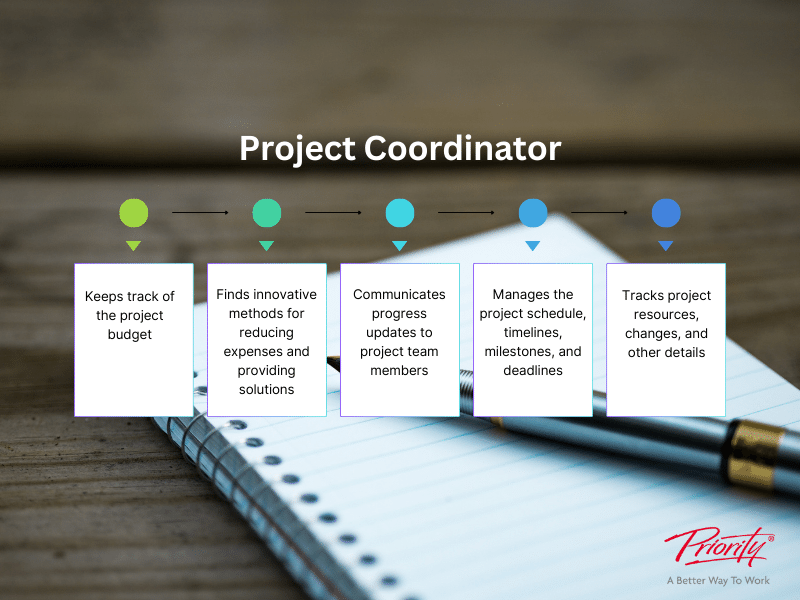If you’ve ever found yourself puzzled about the disparity between a project coordinator and a project manager, you’re not alone. In the realm of project management, these two roles often intertwine, leading to confusion. However, understanding the differences between a project coordinator and a project manager is essential for both aspiring professionals and those working within project-driven environments.
In this article, we’ll be exploring the difference between a project coordinator job and a project manager job, as well as the responsibilities and requirements of each role.
Key Takeaways
- A project coordinator is a professional responsible for administrative tasks and supporting the project manager in the planning and execution of projects
- A project manager is a professional who has overall responsibility for the successful completion of a project, from defining the scope to providing status reports to stakeholders
- While they may sound like extremely similar roles, there are significant differences in their job duties, responsibilities, skill sets, and career advancement opportunities
- Neither of the roles requires formal certifications, although having a degree, diploma or relevant training is a major advantage when applying for project management jobs
What is a Project Coordinator?


A project coordinator assists project teams and managers with administrative tasks, ensuring everything runs smoothly so the project manager can achieve the business’s goals and vision. They also help to identify and resolve any issues that arise during the project stages.
Key Responsibilities
- Keeps track of the project budget
- Finds innovative methods for reducing expenses and providing solutions
- Communicates progress updates to project team members
- Manages the project schedule, timelines, milestones, and deadlines
- Tracks project resources, changes, and other details
Skills and Qualifications
All project management roles require a similar variety of skills, but there are differences. Project coordinators often take responsibility for budgeting and resource management, as well as other similar administrative tasks. Here are some of the soft and hard skills necessary for the role:
Soft Skills
- Problem-solving
- Time management skills
- Conflict resolution
- Communication skills
Hard Skills
- Data entry and management
- Understanding of industry and company-standard software
- Basic maths skills
- Resource management skills for tracking supplies
Qualifications
There are no formal qualifications or certifications that are required to become a project coordinator, but some businesses and hiring managers may prefer candidates with relevant project management experience, education, or training. Here are some qualifications that can give you an advantage as a project coordinator:
- Bachelor’s degree in a relevant field
- Project management training or certification, such as a Certificate III or Cert IV
- Training in project management tools and software, such as Microsoft Project
- Certifications in specific project management skills, such as budgeting, scheduling or risk management
- Additional training in relevant areas, such as communication or leadership skills
- Relevant experience in project coordination or related roles
Ideal candidates for project coordinator roles
- Junior project managers
- Individuals seeking a career in project management
- Professionals with relevant experience or formal knowledge of project management
- Recent graduates with relevant project management certifications
What is a Project Manager?


A project manager takes on a leadership role, overseeing the project plan and the entire process from ideation to completion. They’re responsible for ensuring that all aspects of a project, from the budgets to the schedules to the processes, are successful and delivering value to superiors.
Key Responsibilities
- Make integral decisions with clients and senior management
- Create detailed plans and providing objectives
- Delegate duties to other relevant staff members
- Hire extra people when necessary
- Ensures project goals are reached
Skills and Qualifications
Soft Skills
- Leadership
- Stress management
- Multitasking
- Resource management
Hard Skills
- Budget management
- Understanding of industry and company-standard project management software
- Quality control
- Organising materials, supplies, and other resources
Qualifications
Like project coordinators, there aren’t any formal qualifications or certifications that are required to become a project manager, but relevant training, certifications, and experience will always be an advantage.
Keep in mind that the qualifications to become a project manager may vary depending on the industry, company, and specific projects. In saying that, here are some common qualifications and certifications that can help you become a project manager:
- Bachelor’s or master’s degree in a relevant field
- Experience in project management, either as a team member or assistant project manager
- Project management training or certification, such as a Certificate III, IV or Diploma of Project Management
- Additional training in relevant areas, such as communicationor leadership skills
- Relevant experience in project coordination or related roles
- Training in project management softwareand tools
Ideal candidates for project manager roles
- Experienced project managers or professionals in roles of authority
- Individuals seeking a leadership role in project management
- Business analysts and professionals in similar positions
- Recent graduates with relevant project management certifications
3 Key Differences between Project Coordinators and Project Managers


While project coordinators and project managers may sound like extremely similar roles, there are significant differences in their job duties, responsibilities, skill sets, and advancement opportunities within their careers.
1. Responsibilities
Project coordinator duties can include scheduling meetings, coordinating resources, tracking project progress, and ensuring that project documentation is up to date. They may also be responsible for communicating with team members and stakeholders, and providing status updates to the project manager.
On the other hand, project managers have overall responsibility for the successful delivery of a project. They define the scope, develop project plans, allocate resources, manage risks, and ensure that the project is completed on time, within budget, and to the satisfaction of stakeholders. They may also negotiate with vendors and contractors, and make decisions that impact the project’s outcome.
While project coordinators support project managers in the execution of projects, project managers have ultimate accountability for the project’s success.
2. Skills and experience required for the position
Project coordinators typically require strong organisational, communication, and administrative skills, as they’re responsible for coordinating project activities and ensuring that documentation is up to date. They may also need to have basic knowledge of project management tools and methodologies, and be able to work effectively in a team environment.
Project managers require a more extensive set of skills and experience. They need to have strong leadership, communication, and problem-solving skills. They’re responsible for managing project teams, negotiating with stakeholders, and making critical decisions that impact the project’s outcome. Project managers also require a deep understanding of project management methodologies, tools, and techniques, and are more likely to require certification in project management.
While project coordinators require strong administrative and planning skills, project managers need a more extensive set of leadership, communication, and project management skills and experience.
3. Career path and advancement opportunities
Project coordinators tend to have more limited advancement opportunities within the project management field, as their role is typically a support function. However, they might be able to advance within their company into roles such as project administrator or program coordinator. Alternatively, they may choose to specialise in a specific area of project management, such as risk management or quality assurance.
Project managers, on the other hand, have more opportunities for career advancement. They may progress to more senior project management roles, such as program manager or portfolio manager, or they may choose to specialise in a particular area. Additionally, project managers may have opportunities to move into other areas of business, such as operations or strategic planning.
In summary, project coordinators may have more limited opportunities for career advancement than project managers, but experience, certifications, and training will allow you to climb the project management ladder.
There are many differences and similarities between the roles of project manager and project coordinator. Regardless, they’re both significant project management jobs that facilitate organisation, productivity, and coordination.
Across several industries, companies, and departments, project management is vital for producing consistently high-quality deliverables for clients, customers, and stakeholders.
Grow your project management skills
If you’re looking for project management training, Priority Management is here to help. With over 40 years of experience, we’re dedicated to changing the way you and your business operate for the better. We offer several project management courses, helping you and your workers continuously meet demand and deliver value while working smarter, not harder.
Regardless of the size of your company, the industry you work in, or your project goals, our expert instructors tailor their training to support you and your team.
We offer individual Certification courses, or in-house training options. If you have any questions, or you’re interested in our courses and services, get in contact with us today!
